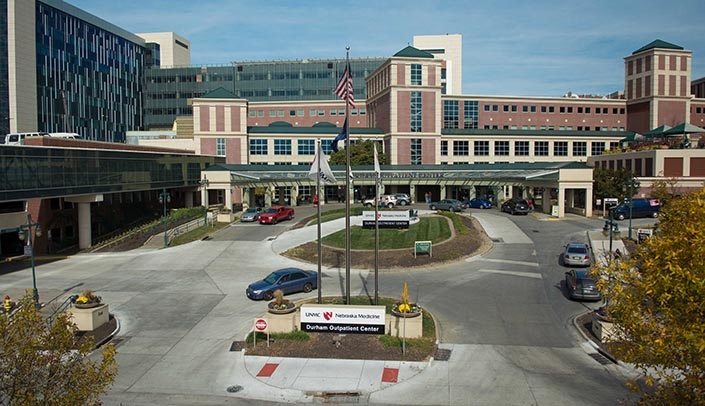For now, visitor restrictions at Nebraska Medicine will remain in place.
“I understand this is challenging for our patients and our caregivers,” said Sue Nuss, Ph.D., chief nursing officer and vice president of operations at Bellevue Medical Center. “We must remember we are viewed as a leader in our community. We need to do the right thing.”
Although other health systems in the city have begun relaxing their visitor restrictions and the number of COVID-19 cases across Nebraska is on the decline, Douglas County, has seen an average of 100 new cases identified each day over the past two weeks.
It’s not the sharp decline medical center infectious disease experts would like to see.
“We need to reflect on why we put these restrictions into effect in the first place,” said Mark Rupp, M.D., medical director of infection control and epidemiology and chief of the UNMC Division of Infectious Diseases. “In late March, when the restrictions went into place, we were observing single digit rises in new cases in the community per day. The need for visitor restrictions is more acute today than when it went into effect. The biggest difference is that people are now more complacent about COVID-19. We cannot afford to be complacent. We want to keep our patients and our providers safe.”
There are common-sense exceptions to this policy.
“We want to enforce this in a compassionate way,” Dr. Nuss said. “For example, if someone can’t make it to their clinic appointment without an escort, we need to allow that.”
Here are the exceptions to the visitor restriction policy:
- One healthy, designated visitor for a labor and delivery patient.
- Two approved healthy parents (or adults) for a pediatric, one at a time.
- Two approved healthy parents (or adults) for NICU patients.
- Visitors are allowed for end-of-life patients. View the guidelines on how to facilitate those visits. Catholic priests from St. Cecilia are approved for both sacraments of anointing of the sick or reconciliation for Catholic patients.
Here are some of the extenuating circumstances when patients can have one friend/family escort/visitor:
- Patients with a disability, developmental/cognitive delays or unable to communicate or understand diagnosis and treatment options.
- Inability to communicate (aphasia, dementia).
- New cancer diagnosis visit, cancer relapse visit or end-of-life visit.
- Required family member education for care of patient.
- Patient infusion visit to last for several hours.
- For transplant patients who need a caregiver to be compliant with policy, one designated person will be allowed to stay in the room.
- For PT/OT patients who need a family member to be present for patient education/teaching, one designated person can accompany the patient.
“If it is clearly necessary for a family member to be present to optimize care, we want our providers to feel empowered to allow that,” Dr. Nuss said. “The expectation is that providers discuss this request with the department leaders to ensure everyone is on the same page.”
In those circumstances, an “authorized visitor” should be added to One Chart.
Patients arriving for clinic appointments will continue to be screened. Those with no symptoms will be given a green sticker with the day’s date. Patients with signs of illness will be given a red sticker with the day’s date and a procedural mask. Everyone will be asked to perform hand hygiene.
“We want to ensure our patients know about our visitor restrictions before they arrive,” Dr. Nuss said. “If you have an opportunity to speak to a patient before their appointment or procedure, please be sure to share this. We will provide a standardized message for any and all areas who contact patients prior to their visit.”
The committee will continue to meet and evaluate COVID-19 activity in the community and discuss the safety of relaxing visitor restrictions.
“We are very hopeful that if cases continue to decline in our community, we’ll be able to liberalize visitation,” Dr. Rupp said. “Until then, we need to judiciously allow for visitors in extenuating circumstances.”
Providers can refer to the visitor restriction section on the COVID-19 Infectious Disease Nebraska Medicine intranet site.

I’ve been a patient at Nebraska Medicine for nearly four weeks now. I do understand the need for control and caution; however, being hospitalized without being allowed to have any family with you except via phone or FaceTime is nothing short of excruciating. The staff do not have any extra time to visit, tend to minor needs, or offer emotional support through rough times; further, the impact of not being able to be with me in person has caused extraordinary fear, powerlessness and grief for my closest loved ones. This policy seems unnecessarily draconic and very much not conducive to patient and family healing and wellness. Is there not some strategy possible to allow patient visitors who have tested negative for COVID19 and requiring careful use of masks and hand hygiene while outside of patient rooms?